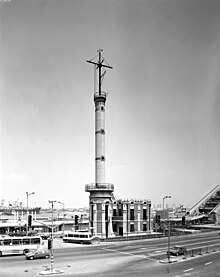Gutzlaff Signal Tower
| Gutzlaff Signal Tower | |
|---|---|
 | |
 | |
| General information | |
| Architectural style | Beaux-Arts |
| Town or city | Shanghai |
| Country | China |
The Gutzlaff Signal Tower, also known as the Bund Weather Tower or the Bund Signal Tower (外滩信号台),[citation needed] is a major landmark in Shanghai's Bund. It is a 36.8m tall (49.8m focal height[1]) signal station designed and built by Spanish innovator and industrialist Modesto Marti de Sola, through his company Shanghai Reinforced Concrete Company Co. in the year 1907. It was built in Beaux-Arts style, originally intended to provide weather information to ships on the Huangpu River, in particular typhoon warnings.

History
[edit]A signal station was first built in the Bund area by the French in 1865, soon after the cession of Shanghai's foreign concession. It was rebuilt in 1884, at the time of the establishment of the Zikawei Observatory by French Jesuits to offer weather forecast services to the port.[2][1] The current structure was built in 1907,[3] and named after Karl Gützlaff. The tower signaled weather reports five times a day, and gave emergency flag signals in case of typhoon or sudden inclement weather. Its operation was discontinued in 1956.
The tower was moved 22.4 m to its current location in 1993,[4] and was reconstructed in 1999. Currently, the ground floor houses a museum of history of the Bund, and the first floor a cafe.
References
[edit]- ^ a b Qinggong, Jiang (2015). Shanghai Height (1st ed.). Tongji University Press. ISBN 978-7560859378.
- ^ "SHui. A spatial experience to reconnect Shanghai's inhabitants to the presence of the water in the city". www.politesi.polimi.it. Retrieved 2023-12-16.
- ^ Harland, Robert G.; Xu, Johnny (2021). Repositioning Graphic Heritage booklet (online version) (Report). Loughborough University. doi:10.17028/rd.lboro.14273105.v1. Retrieved 2023-12-16.
- ^ "'Ever-changing waterfronts': Urban development and transformation processes in ports and waterfront zones in Singapore, Hong Kong and Shanghai", Port Cities in Asia and Europe, Routledge, pp. 75–103, 2008-11-20, retrieved 2023-12-16
External links
[edit] Media related to Semaphore of the Bund at Wikimedia Commons
Media related to Semaphore of the Bund at Wikimedia Commons- High resolution photographs of historical architecture in Shanghai.
